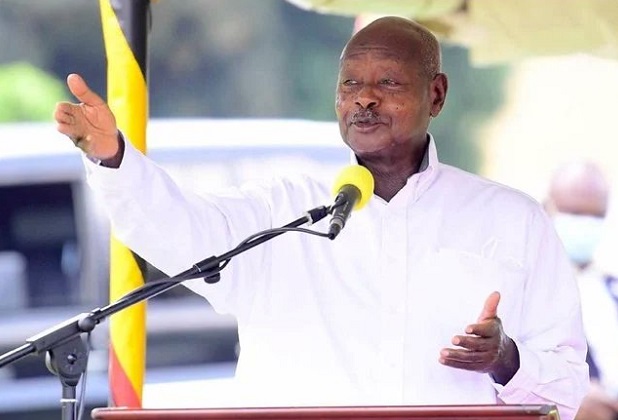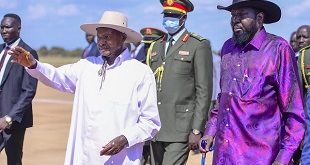
Kampala, Uganda | THE INDEPENDENT | The office of the President has introduced a web-based tool to track promises made by the government through the manifesto and presidential directives.
The new tool will collect information directly from technical officers in government Ministries, Departments and Agencies and local government, as well as data from other government monitoring and evaluation mechanisms.
Prof Ephraim Kamuntu, the senior presidential advisor on manifesto implementation and economic affairs observes that the tool will substitute the Manifesto Implementation Unit which has turned into a mere ritual, with government entities often unable to provide data evidence for their achievements or failures under the manifesto.
Prof Ephraim Kamuntu made the remarks on Tuesday afternoon during the launch of a new tool at the office of the president. The tool which relies on data for evidence progress reporting, will be used for the midterm review of the manifesto implementation this year.
Prof Kamuntu added that the new tool will revolutionize the tracking of manifesto implementation, providing better evidence and challenging ministers to substantiate their claims regarding their achievements.
Willis Bashasha, the Director of the Manifesto Implementation Unit-MUI, said that to ensure accurate and reliable data, the unit has enlisted experts from various agencies, including the Office of the President, National Planning Authority, Office of the Prime Minister, Kampala Capital City Authority, and Uganda Bureau of Statistics.
Bashasha added that after being rolled out, technical officers will input the necessary data, and members of the task force along with the Manifesto Implementation Unit, members will conduct physical visits as needed to monitor projects and programs. This activity will take place in April before the Manifesto Week scheduled for May.
He added that after being rolled out, the technical officers will input the required data, and task force members along with members of the Manifesto Implementation Unit, will also carry out physical visits where necessary to monitor projects and programs. This activity will take place in April before Manifesto Week, which will be held in May.
Meanwhile, Prof Kamuntu emphasized that while reviewing the manifesto implementation this year, more emphasis should be put on understanding how the PDM is working, as it is the flagship program for the 2021/2026 NRM manifesto.
Kamuntu also emphasized other areas that he believes the NRM government should urgently address. These include tackling unemployment and enhancing skills to reduce the number of Ugandan youths seeking jobs in the Middle East. Additionally, he highlighted the importance of resolving issues related to the cost of capital and addressing the cost of power to drive industrialization.
In 2021, the NRM presented a manifesto for their candidate Yoweri Kaguta Museveni, centred around five priority areas: Creating Wealth and Jobs; Delivering Education and Health; Ensuring Justice and Equity; Protecting Life and Property; and Achieving Economic and Political Integration.
By the end of the second year of implementation (2023), the Manifesto Implementation Unit reported that the government had successfully achieved over 20 per cent of its commitments. Notable accomplishments included the construction of seed secondary schools, efforts to ensure peace and security, improvements in access to safe water, successful youth skilling programs, and the establishment of health centres, among other achievements.
Milly Babalanda, the Minister in charge of the Presidency, said that since the election, there have been positive trends towards fulfilling NRM’s promises, but acknowledged that there are still challenges to overcome. She expressed concern that corruption remains one of the major hindrances, diverting significant funds away from projects intended to benefit the general public.
“Ever since the election, there have been some challenges like COVID-19 but corruption remains a significant problem. Even in the recent cabinet meeting, the president addressed this issue. There has been a public outcry through online and social media campaigns, and the president has reiterated that he is going to address the matter,” the minister said.
A 2021 survey by the Inspectorate of Government revealed that the government loses 20 trillion Shillings annually due to corruption. The survey indicated that every passing hour one million Shillings lost to corruption. The key areas affected include 131 billion Shillings lost through taxation, 459 billion Shillings in user fees for utilities, 820 billion Shillings in natural resources, and 15 billion Shillings in environmental degradation.
Additionally, the survey identified losses of two billion Shillings due to absenteeism in government departments, 451 billion Shillings in health care and education services, 86 billion Shillings in security provision, 590 billion Shillings in procurement and budgeting, and 233 billion Shillings in regulation.
Recent social media campaigns by Ugandans have highlighted areas where the government falls short of public expectations, covering sectors such as health, transport, and education among others.
*******
URN
 The Independent Uganda: You get the Truth we Pay the Price
The Independent Uganda: You get the Truth we Pay the Price



